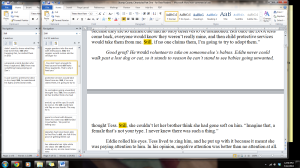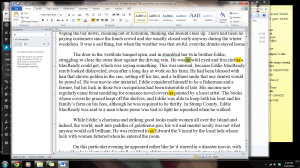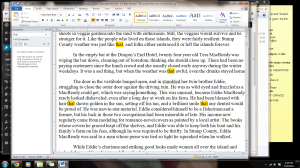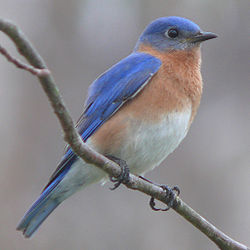 Whee!!! I am merrily spinning through my mental universe, spewing my thoughts onto the keyboard when suddenly I am brought up short by none other than the dreaded Over Used Word.
Whee!!! I am merrily spinning through my mental universe, spewing my thoughts onto the keyboard when suddenly I am brought up short by none other than the dreaded Over Used Word.
Somebody shoot me now! But at least I have that magic tool “Control-F’ to help me search for words that seem to come up too frequently. By clicking the down arrow on the menu on the left, I can navigate easily to each instance of the word and decide whether to keep it or remove it. Many times, removing it is the solution, and often you don’t have to replace it with anything at all. The sentence can be stronger for not having the word at all.
When I look back on my work I can see where my mind seemed to run out of options and I developed a ‘fall-back’ habit, which in turn, leads to a stale narrative. Some of my favorite fall-back words?
 As. This word can be useful, but insidious. Like bamboo in an unwary gardener’s first garden, ‘As’ creeps into every paragraph if not kept in containers. To search for it, hit control-F. When the navigation box pops up on the left, key a space before and a space after to isolate only the two-letter word as, or every instance of any word containing those letters together will pop up. ( as )
As. This word can be useful, but insidious. Like bamboo in an unwary gardener’s first garden, ‘As’ creeps into every paragraph if not kept in containers. To search for it, hit control-F. When the navigation box pops up on the left, key a space before and a space after to isolate only the two-letter word as, or every instance of any word containing those letters together will pop up. ( as )
 That. Many times, removing it is ideal the solution, and often you don’t have to replace it with anything at all. Once again, the sentence will be stronger for not having the word at all.
That. Many times, removing it is ideal the solution, and often you don’t have to replace it with anything at all. Once again, the sentence will be stronger for not having the word at all.
Searching for these words and others like them in our precious manuscript can seem to be a daunting task, but with this tool it is much less trouble to do than it seems like it will be at first. It must be done on a word by word basis, because Global changes can inadvertently wreak unimaginable havoc with your manuscript! Think of how many words in the English language have the two letters ‘a’ and ‘s’ next to each other in them? Was, Assign, Bass–you see the problem with global changes. Never click ‘Replace All’!
For small words that are frequently found inside of larger words, use the ‘space word space’ trick and you will have much better results.
And now here is my list of handy-dandy overused and the alternatives that I fall back on:
Overused Words and some alternatives
about – approximately, nearly, almost, approaching, close to
absolutely – unconditionally, perfectly, completely, ideally, purely
activity – action, movement, operation, labor, exertion, enterprise, project, pursuit, endeavor, job, assignment, pastime, scheme, task
add – attach, affix, join, unite, append, increase, amplify
affect – adjust, influence, transform, moderate, incline, motivate, prompt
amazing – overwhelming, astonishing, startling, unexpected, stunning, dazzling, remarkable
awesome – impressive, stupendous, fabulous, astonishing, outstanding
bad – defective, inadequate, poor, unsatisfactory, disagreeable, offensive, repulsive, corrupt, wicked, naughty, harmful, injurious, unfavorable
basic – essential, necessary, indispensable, vital, fundamental, elementary
beautiful – attractive, appealing, alluring, exquisite, gorgeous, handsome, stunning
begin – commence, found, initiate, introduce, launch, originate
better – preferable, superior, worthier
big – enormous, extensive, huge, immense, massive
boring – commonplace, monotonous, tedious, tiresome
bring – accompany, cause, convey, create, conduct, deliver, produce
cause – origin, stimulus, inspiration, motive
certain – sure, unquestionable, incontrovertible, unmistakable, indubitable, assured, confident
change – alter, transform, vary, replace, diversify
choose – select, elect, nominate, prefer, identify
decent – respectable, adequate, fair, suitable
definitely – unquestionably, clearly, precisely, positively, inescapably
easy – effortless, natural, comfortable, undemanding, pleasant, relaxed
effective – powerful, successful, efficient
emphasize – underscore, feature, accentuate
end – limit, boundary, finish, conclusion, finale, resolution
energy – vitality, vigor, force, dynamism
enjoy – savor, relish, revel, benefit
entire – complete, inclusive, unbroken, integral
excellent – superior, remarkable, splendid, unsurpassed, superb, magnificent
exciting – thrilling, stirring, rousing, dramatic
far – distant, remote
fast – swift, quick, fleet, hasty, instant, accelerated
fill – occupy, suffuse, pervade, saturate, inflate, stock
finish – complete, conclude, cease, achieve, exhaust, deplete, consume
funny – comical, ludicrous, amusing, droll, entertaining, bizarre, unusual, uncommon
get – obtain, receive, acquire, procure, achieve
give – bestow, donate, supply, deliver, distribute, impart
go – proceed, progress, advance, move
good – satisfactory, serviceable, functional, competent, virtuous, striking
great – tremendous, superior, remarkable, eminent, proficient, expert
happy – pleased, joyous, elated, jubilant, cheerful, delighted
hard – arduous, formidable, complex, complicated, rigorous, harsh
help – assist, aid, support, sustain, serve
hurt – injure, harm, damage, wound, impair
immense – huge, vast, enormous, massive, gigantic, mammoth, colossal
important – significant, substantial, weighty, meaningful, critical, vital, notable
interesting – absorbing, appealing, entertaining, fascinating, thought-provoking
job – task, work, business, undertaking, occupation, vocation, chore, duty, assignment
keep – retain, control, possess
kind – type, variety, sort, form
know – comprehend, understand, realize, perceive, discern
like – similar, equivalent, parallel
like– enjoy, relish, appreciate
main – primary, foremost, dominant
make – build, construct, produce, assemble, fashion, manufacture
mean – plan, intend, suggest, propose, indicate
mean – small, cheap, hurtful
more – supplementary, additional, replenishment
need – essential, necessity, want, require, requirement, prerequisite, basic, must, requisite
new– recent, modern, current, novel
next – subsequently, thereafter, successively
nice – pleasant, satisfying, gracious, charming
old – aged, mature, experienced, used, worn, former, previous
open – unobstructed, accessible
part – section, portion, segment, detail, element, component
perfect – flawless, faultless, ideal, consummate
plan – scheme, design, system, plot
pleasant – agreeable, gratifying, refreshing, welcome
prove – demonstrate, confirm, validate, verify, corroborate
quick – brisk, prompt, responsive, rapid, nimble, hasty
really – truly, genuinely, extremely, undeniably
regular – standard, routine, customary, habitual
see – regard, behold, witness, gaze, realize, notice
small – diminutive, miniature, minor, insignificant, slight, trivial, mean
sometimes – occasionally, intermittently, sporadically, periodically
take – grasp, capture, choose, select, tolerate, endure
terrific – extraordinary, magnificent, marvelous
think – conceive, imagine, ponder, reflect, contemplate
try – attempt, endeavor, venture, test
use – employ, operate, utilize
very – unusually, extremely, deeply, exceedingly, profoundly
want – desire, crave, yearn, long
It is strange how these words seem to crop up all the time in the rough draft of my work and I have to stay on top of them, using my wide vocabulary! The point is, you must make a list of words YOU use too often, and find alternatives or eliminate them if they are not necessary. Believe me, this list of words to watch for and solutions for expressing that thought without being repetitive grows and evolves all the time, just as my writing does.
Many of these first draft bloopers are descriptors -‘ly’ words. Like salt and pepper, they are usually not required in too large of quantities so closely examine your ms to make sure it isn’t so thick with description your reader’s teeth hurt from the sweetness!
Happy writing, and may the over-used words of heck NOT bloop in your manuscript!









Another clever way to do this is use a site like Wordle to make a word cloud; it’ll eliminate common, necessary word (the, and, etc.) and show you which words you’re using a lot.
LikeLike
An excellent tool.
LikeLike
And don’t forget my personal bugaboo:
THEN
LikeLike
lol – it’s one of mine too!
LikeLike
Fantastic list – thanks for this Connie 🙂
LikeLike
I’ve a ton of overused modifiers that I keep in an exceptionally dark, dankly chill, and poorly illuminated closet.
It just seemed to be the right spot for storing them.
LikeLike
Lol! Well thanks for turfing them out into the light of day 🙂
LikeLike
I find searching for ly can be useful for eliminating unnecessary adverbs.
Another great post.
LikeLike